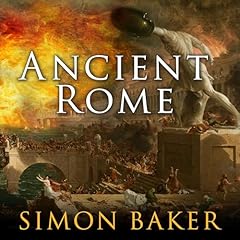
The Flavian Dynasty
The History of the Roman Empire During the Reigns of Vespasian, Titus, and Domitian
No se pudo agregar al carrito
Add to Cart failed.
Error al Agregar a Lista de Deseos.
Error al eliminar de la lista de deseos.
Error al añadir a tu biblioteca
Error al seguir el podcast
Error al dejar de seguir el podcast
 Exclusivo para miembros Prime: ¿Nuevo en Audible? Obtén 2 audiolibros gratis con tu prueba.
Exclusivo para miembros Prime: ¿Nuevo en Audible? Obtén 2 audiolibros gratis con tu prueba.Compra ahora por $12.28
-
Narrado por:
-
Gregory T. Luzitano
The 12 months known in history as the "Year of the Four Emperors" was a pivotal chapter in the long epoch of the Roman Empire. It marked the tumultuous end of the Julio-Claudian dynasty and the advent of a year of civil war, renewal, and realignment, the result of which was the establishment of a new era and the founding of a new (and arguably more rational and responsible) imperial dynasty.
The controversial year began with the decline of the Julio-Claudian dynasty under the rule of Emperor Nero, the last ruler of a dynasty founded by Julius Caesar, who was perhaps the most famous Roman emperor that ever was. The Julio-Claudian succession included such names as Augustus, Tiberius, Caligula, Claudius, and of course Nero - names that resonate with great power throughout the chronicles of Roman history, in many cases, thanks to the violence, madness, misrule, and decadence that seemed to take root at the center of imperial Rome at the dawn of the common era.
Having left no heir, Nero’s death plunged the empire into confusion and chaos, bringing to an end the Julio-Claudian lineage while at the same time offering no clear rule of succession. This presented the opportunity for influential individuals in the empire, and in particular provincial governors who also commanded large military garrisons, to express and further their own ambitions to power. The result was a period of instability and civil war as several pretenders to the throne, among them the emperors Galba, Otho, and Vitellius, gained and lost power until, finally, the emperor Vespasian seized and retained the imperial principate.
Vespasian imposed order and discipline on a chaotic empire and founded the Flavian Dynasty, which survived until AD 96, encompassing the reigns of Vespasian and his two sons, Titus (AD 79-81) and Domitian (AD 81-96). The Flavian Dynasty also ended in brutality, with Domitian being hacked to death by his own secretarial staff in AD 96. In between, however, Vespasian, Titus, and even the reviled Domitian were responsible for many innovations that served the empire well in the years that followed, and they prepared the way for the empire’s zenith from AD 96 to 192.
The Flavian emperors were very different in temperament from each other, but all three contributed in their own ways to the consolidation and expansion of the imperial system individually. All three men, to a greater or lesser extent, added to the imperial city and the Flavian amphitheater, known in modern times as the Colosseum, which remains as one of the most iconic and enduring physical reminders of the glory of Rome.
©2019 Charles River Editors (P)2019 Charles River EditorsLos oyentes también disfrutaron:




















feels like an intro
Se ha producido un error. Vuelve a intentarlo dentro de unos minutos.


